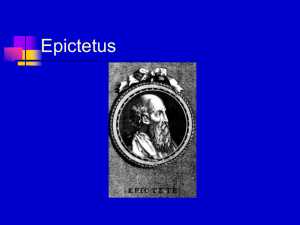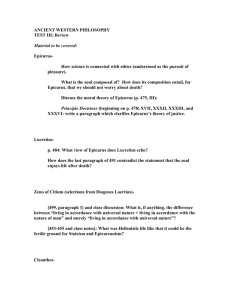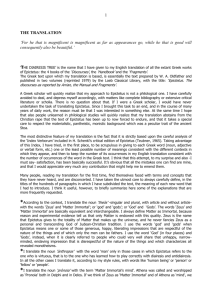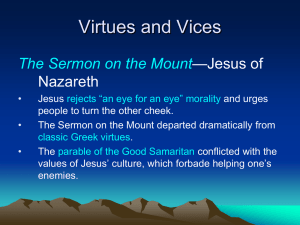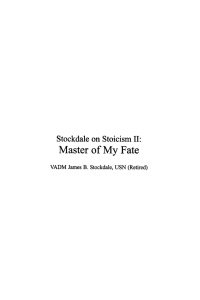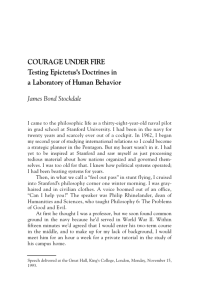Matthew Lemons Philosophy 430 Final Paper Travis Butler
advertisement
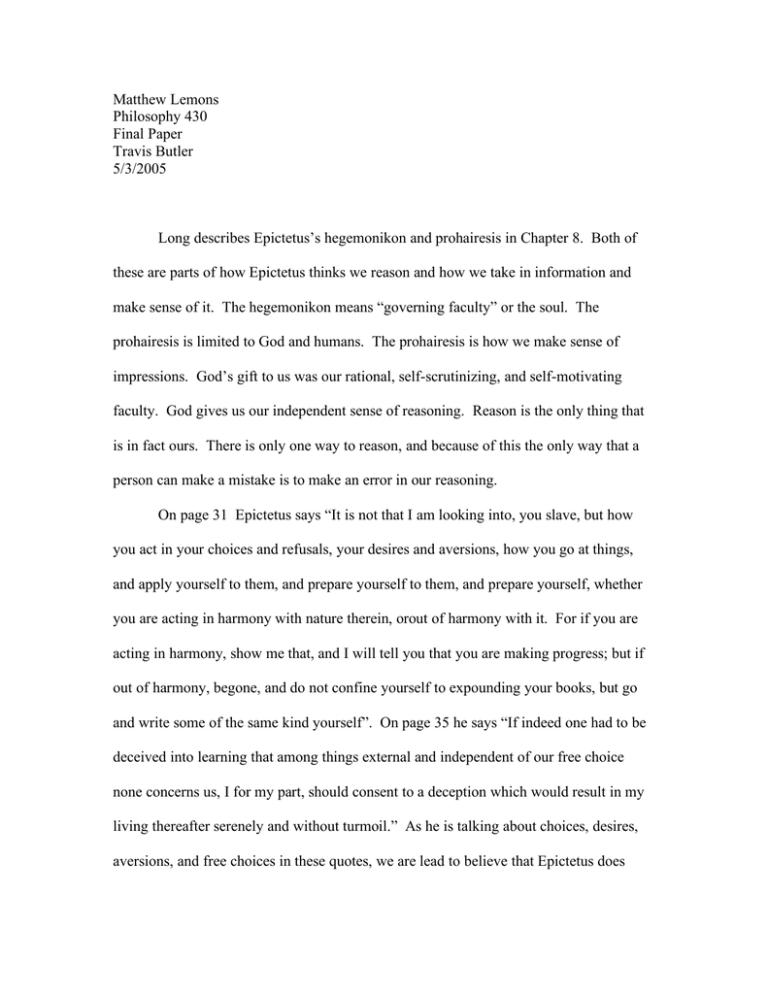
Matthew Lemons Philosophy 430 Final Paper Travis Butler 5/3/2005 Long describes Epictetus’s hegemonikon and prohairesis in Chapter 8. Both of these are parts of how Epictetus thinks we reason and how we take in information and make sense of it. The hegemonikon means “governing faculty” or the soul. The prohairesis is limited to God and humans. The prohairesis is how we make sense of impressions. God’s gift to us was our rational, self-scrutinizing, and self-motivating faculty. God gives us our independent sense of reasoning. Reason is the only thing that is in fact ours. There is only one way to reason, and because of this the only way that a person can make a mistake is to make an error in our reasoning. On page 31 Epictetus says “It is not that I am looking into, you slave, but how you act in your choices and refusals, your desires and aversions, how you go at things, and apply yourself to them, and prepare yourself to them, and prepare yourself, whether you are acting in harmony with nature therein, orout of harmony with it. For if you are acting in harmony, show me that, and I will tell you that you are making progress; but if out of harmony, begone, and do not confine yourself to expounding your books, but go and write some of the same kind yourself”. On page 35 he says “If indeed one had to be deceived into learning that among things external and independent of our free choice none concerns us, I for my part, should consent to a deception which would result in my living thereafter serenely and without turmoil.” As he is talking about choices, desires, aversions, and free choices in these quotes, we are lead to believe that Epictetus does seem to think that there is a line between us and the rest of the world. There is a line between us and God. He does believe in freedom and individual actions. On page 33, Epictetus talks about the need to align ourself with nature. “Where then is progress? If any man among you, withdrawing from external things, has turned his attention to the question of his own moral purpose, cultivating and perfecting it so as to make it finally harmonious with nature, elevated, free, unhindered, untrammeled, faithful, and honourable; and if he has learned that he who craves or shuns the things that are not under his control can be neither faithful or free, but must himself of necessity be changed and tossed to and fro with them, and must end by subordinating himself to others, those, namely who are able to procure or prevent these things that he craves or shuns” The importance of aligning ourselves with nature would make it more likely that our souls are part of nature. Scientific proof that all future actions must be caused by past events would require Epictetus to change his view of the fully-autonomous self some, but ultimately he could still argue that a person is free and that they are morally responsible. Since Epictetus has talked both about free will, and the importance of aligning ourselves with God and nature, it seems unlikely that he would want to deny free will entirely. We would be left with autonomy, but in a different sense. While the accepted definition of freedom would involve a strong sense of individuality and ability to choose our actions, Epictetus’s version of the soul involves being part of God so we should expect his sense of freedom to be different. We are no longer free independently of nature, but only as a part of nature. Natural causality seems to imply that our actions fit into laws of nature, and that our future actions are predictable and necessary like things in the scientific and mechanical world. God created the natural world and all the rules of the natural world, so if the natural world causes future actions of people, then God is responsible for the future actions of people. Necessary causality for all future actions would require Epictetus to think the line between individual soul, God, and the rest of the world. He already is talking about the need for us to align ourselves with God, or figure out how we fit into the puzzle of the universe. He already talks about the prohairesis as being something that only humans and God’s have. It seems reasonable that he would make the move that we are only us in the sense of how we relate to the rest of the world or God. The line between our individual selves, God, and the universe would have to be blurry or nonexistent. God would now be part of each person’s prohairesis. Epictetus talks about God created all the people, objects, and animals of the world. All these things exist for a reason. God created the natural world. God created the laws of science and nature. They all fit together by design and on purpose. Since God created the laws of science and world in which people fit into, the idea of past events causing future events sounds reasonable. Long summarizes Epictetus’s view of autonomy as the “correct use of impression”. It seems that this would still be the case with scientifically-necessary causality. Since all future actions would be determined by past actions, it doesn’t seem possible that there could be an incorrect use of impression. Epictetus thinks we need to align ourselves with God as much as possible. Epictetus I thi9nk could argue for a slightly different sense of self and sense of freedom that comes from scientifically-necessary causality. The line of where we leave off and where the rest of the world begins, or where we leave off and where God begins is blurry or nonexistent. God is a part of us. The world is a part of us. By uniting ourselves with God, we find our place in the world. Since God, nature, and scientific rules are part of us, our actions are also part of the world. Humans are still morally responsible for their actions even if past events cause all future actions. All people are aligned with God, and God created nature and the rules of nature. There is still freedom because as people are aligned with God and are part of God, God has the ultimate power to have created a different set of past events, or a different natural world. Even though our current natural world would require that person X do action Y, he is still free in the sense that he is aligned with God, and God could have created a different world and a different set of rules, which have could have caused a different set of past events. An argument against Epictetus’s hypothetical response would be that person X would suffer the sometimes-negative consequences based on their actions. If past events require me to commit murder, it isn’t fair that I (in the separate from God sense) suffer the painful consequences. Epictetus would then point out that Bob’s negative consequences ultimately don’t matter because Bob’s part in the larger puzzle of life is more important. Sometimes people or animals do suffer pain, but this is OK as it is just a piece in the puzzle of the universe that God has created. One person’s pain is necessary for other things to happen in the natural world. On page 47, Epictetus talks about men experiencing unpleasant or painful things. After a slave complains of a runny nose, he asks “Is it reasonable, then, that there should be running noses in the world?” Epictetus responds “Or what do you think Heracles would have amounted to, if there had been a lion like the one which he encountered, and a hydra, and a stag, and a boar, and a wicked and brutal men, whom he made it his business to drive out and clear away? And what would he have been doing had nothing of the sort existed?” On the top of page 41, Epictetus talks about God creating elements of the world and how they fit together. “If God had made colours, but had not made the faculty of seeing them, of what good had it been? None at all. But conversely, if He had made the faculty, but in making objects had made the incapable of falling under the faculty of vision, in that case also of what good had it been? None at all. What then, if He had even made both of these, but had not made light? Even thus it would have been of no use. Who is it then, that has fitted this to that and that to this? And who is it that has fitted the sword to the scabbard, and the scabbard to the sword? No one? Assuredly from the very structure of all made objects we are accustomed to prove that the work is certainly the product of some artificer, and has not been constructed at random.” On page 99, Epictetus talks about how God controls the natural world and how people are united with God. “Now when someone asked him how a man could be convinced that each thing which he does is under the eye of God, do you not think, he answered that all things are united in one? -- I do said the other. – Very well, do you not think that what is on earth feels the influence of that which is in heaven? I do, he replied. For how else comes it that so regularly, as if from God’s command?, when He bids the plants flower, they flower, when He bids them put forth shoots, they put them forth, when He bids them bear their fruit, they bear it, when to ripen, they ripen.” On page 43, Epictetus talks about each animal having a different purpose. “For of beings whose constitutions are different, the works and the ends are likewise different. So for the being whose constitutions are different, the works and the ends are likewise different. So for the being whose constitution is adapted to use only, mere use is sufficient, but where a being has also the faculty of understanding the use, unless the principle of propriety can be added, he will never attain the end. What then? Each of the animals God constitutes, one to be eaten, another to serve in farming, another to produce cheese, and yet another for some other similar use; to perform these functions what need they to understand external impressions and to be able to differentiate them? But God has brought man into the world to be a spectator of Himself and of His works, and not merely a spectator, but also an interpreter. Wherefore, it is shameful for man to begin and end just where the irrational animals do; he should rather begin where they do, but end where nature has ended in dealing with us. Now she did not end until she reached contemplation and understanding and a manner of life harmonious with nature” This is another example of Epictetus talking about the importance of uniting yourself with nature.
